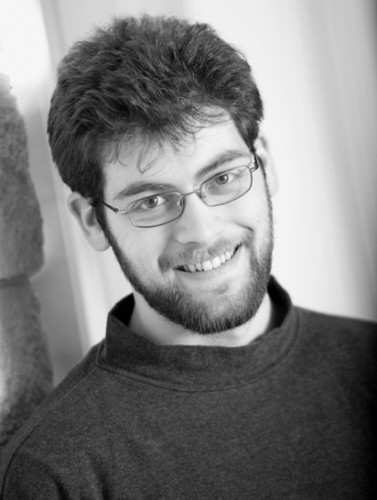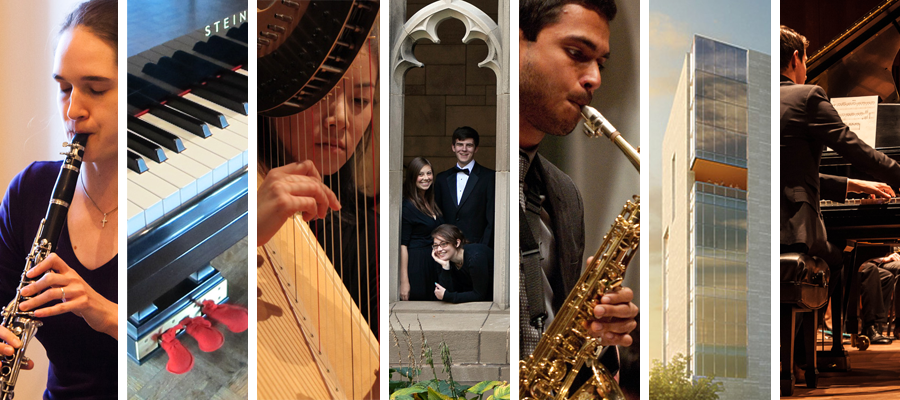 In addition to being a composer, you are also an accomplished pianist. This Friday, April 5th, you will perform a free solo recital at 7:00pm in Fulton Recital Hall. Can you share some about your program and explain how you chose your repertoire?
In addition to being a composer, you are also an accomplished pianist. This Friday, April 5th, you will perform a free solo recital at 7:00pm in Fulton Recital Hall. Can you share some about your program and explain how you chose your repertoire?
The program for my recital, in a lot of ways, focuses around Paris in the early part of the 20th century. There are works by French, Polish, and Russian composers that all relate to one another musically. Fauré, Debussy and Messiaen form the French center of the program, each with a distinct musical voice but all tapping into some form of veiling or blurring of boundaries, whether architectural, visual or spiritual. Scriabin does this as well, though he is Russian, but all the tempo and character indications in his ‘Black Mass’ sonata (which I will be performing) are in French and the music definitely holds some of that veiled smokiness. Then at the beginning of the program we have the two Poles: Chopin lived in France much of his life and one could arguably regard as equally French as Polish when it comes to his musical language, even in something as unmistakably Polish as the mazurka. Szymanowski finds a grittier, more dissonant approach in his mazurkas, but he was so tremendously influenced by Chopin (as were Fauré and Scriabin) that one can find consonance between the differing styles.
You received your B. Mus. in Composition from Oregon’s Willamette University, graduating summa cum laude, before pursuing a Ph.D. at the University of Chicago. Did you take time off prior to pursuing your Ph.D. in composition? What advice would you give an aspiring undergraduate composer who was interested in following a similar path?
I came directly from my Bachelor’s to U. Chicago to pursue my Ph.D. here. I already knew as I finished my degree at Willamette that I would want to pursue doctoral work, and I didn’t love the idea of going through the application process again after the Master’s degree. When I visited the university I knew that it would be a compelling, challenging environment that would encourage musical growth and that I would be able to flourish here. That specific path is not for everyone and the traditional route of pursuing a Master’s degree is totally fine; it’s just not what I chose to do. The decision is an important one that’s entirely personal, so I would ask any undergrad looking at the same path whether they know the Ph.D. is right for them and whether they have explored other options thoroughly to make sure the choice is a good one for their career goals and aspirations.
You have no doubt grown a great deal across your years of study. How has your approach to composition changed? Have you found that your own artistic voice has developed in any unexpected ways?
Of course! Every composer I’ve ever met has described the art as one where you never stop learning and changing. It’s a dynamic process that arcs across your entire life. While I believe that many of my compositional decisions can be traced back to instinct, I think that in the past few years I’ve become more acutely aware of the musical choices I make while I’m in the act of composing, especially regarding pacing a piece and deciding on its form. It’s important to me that the form of a composition should not be a preconceived mold to fill out, but rather an evolving structure related to the musical material within and with a kind of inevitable inner logic. I’ve been especially aware of these decisions, and how they impact a piece, since coming to U. Chicago because I feel that this is an environment in which each composer carefully scrutinizes what they are doing at every moment in their compositions, like carefully chiseled sculptures.
On May 10th, the Pacifica Quartet and Doug Perkins will premiere your work ‘Spandrels’ for string quartet and percussion as a part of Contempo’s “Tomorrow’s Music Today I” concert. Will you, or have you been able to work with this internationally recognized ensemble on your piece? How do you feel it benefits composers to work directly with performers in a collaborative way?
I’ve not yet worked with Pacifica for the TMT I concert, but I am excited to start rehearsing with them closer to the concert date. I have had a couple of chances to work with Doug and he’s provided great insight helping me find specific sounds I want in the piece and choreographing movement between instruments— both of which are critical when writing for percussion. There are all sorts of communicative layers between composer, performer and listener that can be explored through collaboration, and music is very rarely a one-person show, so I feel that in general working with performers is an indispensable asset for composers. When writing a new piece, especially something exposed like a solo or duo, I like to consult musicians who not only know the capabilities of the instrument but can give me a sense of its strengths and weaknesses and whether those apply across all musicians or are specific to a given player. The performer also may find solutions to problems I may not be able to work out because they know how to approach it; this is exactly what happened with the percussion choreography in ‘Spandrels’. Without Doug, I may not have known that several problems could be solved just by moving a few instruments around, placing one or two above or behind something else, etc.
Interview by Julia Tobiska
